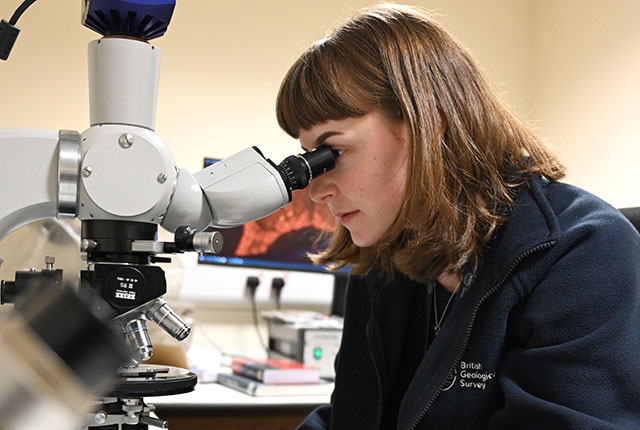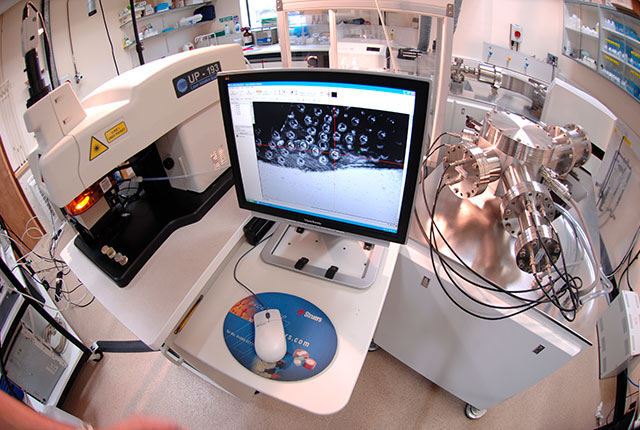
Understanding our Earth
Executive summary
The British Geological Survey (BGS) is a world-leading geological survey that enables governments, industry and the public to make better decisions regarding geology and associated processes in managing the economy, the environment and society. We have a global reach and maintain a standing scientific capability to meet the needs of multiple stakeholders.
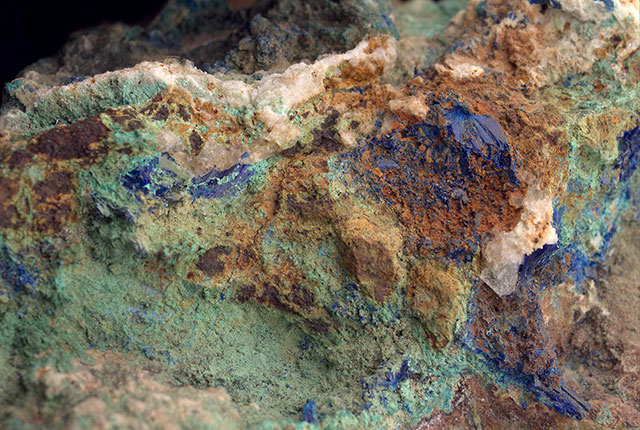
Mineral specimen of linarite, a leadcopper sulphate from Leadhills, 1 cm Lanarkshire. BGS © UKRI
Humanity faces major global challenges that require recurrent and serious consideration by decision makers. On this basis, we have developed a programme of science to meet societal needs, with a focus on four strategic priorities.
- Producing maps and models for the 21st century: we will deliver a new geological survey of the UK through a programme of systematic surveys, targeting strategic priorities onshore and across our continental shelf
- Supporting a more secure energy transition: to enable the effective and responsible use of the subsurface to deliver net zero and resource security for the UK, we will provide new insight for our stakeholders as they optimise multiple geological decarbonisation technologies
- Improving water security: we will optimise the sustainable use of groundwater resources and enhance their role in water security, climate change adaptation, human health and human livelihoods, by integrating groundwater into wider water security thinking and quantifying groundwater resource potential and resilience
- Living with geological hazards: to mitigate and adapt to risk, we will monitor, characterise and forecast earth hazard events and their likely impacts by improving harmonisation in hazard and risk analysis, as well as focusing on hazardous climate change
Our future science priorities and broader science challenge programme are underpinned by strategic ‘pillars’, which have a fundamental and cross-cutting role in the delivery and impact of our science. We will enhance the delivery and communication of our data and knowledge and their application, deliver world leading observational and analytical facilities, and build a workforce for the future.
We will translate our science into policy by informing debate, improving decision making and enhancing policy and regulation with impartial evidence and advice. We will improve and share our knowledge of the subsurface to enable effective decision making. Through public engagement, we will inspire the wider community and inform societal debate and decisions on geological solutions to global challenges.
To deliver our science priorities, broader science programme and underpinning strategic pillars, we require an operational infrastructure with effective and streamlined systems and processes. We need a skilled and motivated workforce, sustainable financial management systems, a fit-for-purpose estate and a resilient IT network. These will take place within a strong framework of risk management and assurance and reflect our organisational core values.
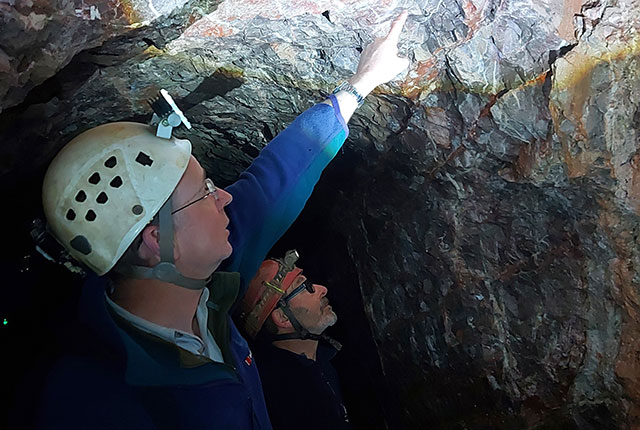
BGS geologists in Wookey Hole, Somerset. The underlying Carboniferous limestones are one of the main targets for deep geothermal potential in Britain. BGS © UKRI
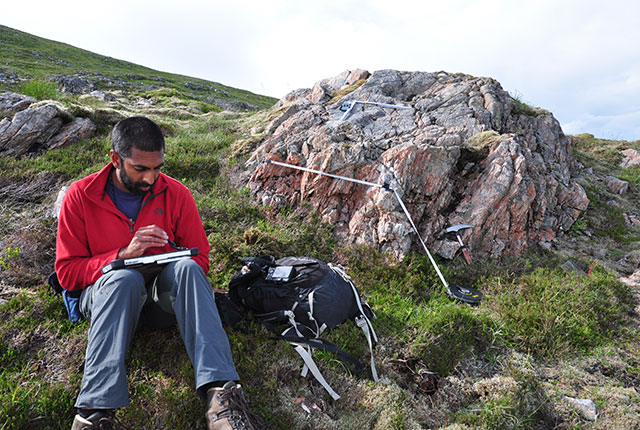
BGS geologist using the SIGMA kit in Coire Glas, Scotland. BGS © UKRI
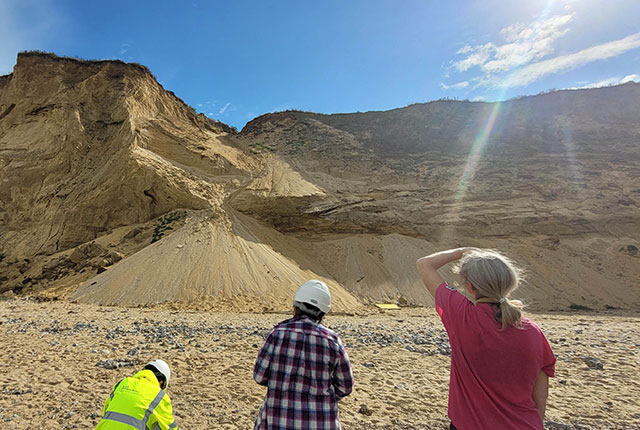
Applied glacial geology field trip in East Runton, Norfolk. BGS © UKRI
The new BGS Strategy
This strategy sets out how the BGS will help its stakeholders make more effective decisions to better manage the economy, the environment and society.
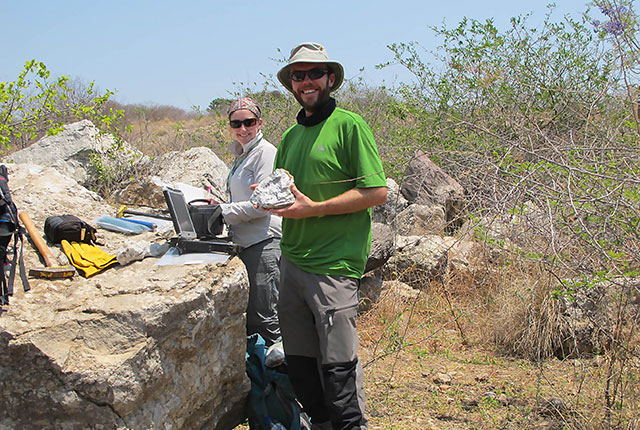
BGS geologists undertaking fieldwork to understand the formation of lithium deposits. Pictured holding a sample of lithium pegmatite from the Kamativi Pegmatite, Zimbabwe. BGS © UKRI
Our lives are inextricably linked with geological materials and associated processes, whether as the source of the energy, materials and water we need, as the foundation of our built environment or as the source of many of the hazards we face daily. As the primary UK provider of geological knowledge, information and data, BGS must constantly innovate and adapt to serve these changing national and international interests.
We recognise that humanity faces unprecedented challenges in maintaining stability in a climatically stressed and resource-limited world, where traditional approaches to science are increasingly seen as outdated and insufficient to meet future needs. We have conducted a thorough review of societal needs and used this to develop a broad programme of science, focusing on our four strategic priorities.
The new BGS Strategy outlines how we will invest in the generation of relevant data, information and knowledge, including the provision of relevant advice to inform decisions about existing problems as well as new and evolving challenges.
Our Vision
To be a leading and trusted provider of geological data and knowledge to meet the societal need for a sustainable future.
Our Mission
To use our knowledge of geology to address societal challenges. We generate data, information and expertise through observation, analysis and characterisation of the Earth and its geological processes. We work at local, regional, national and global scales, and monitor at multiple temporal scales, from real-time to multi-decadal. We are independent and impartial.
About BGS
BGS is a world-leading geological survey that undertakes strategic science for the benefit of society. We are part of UK Research and Innovation (UKRI) and a research centre under the Natural Environment Research Council (NERC). BGS is a public body with an independent board.
Global reach
BGS primarily delivers research, products and services relating to the UK, where it is based. We also operate internationally to maximise the impact of our science and develop the global standing of our scientists. In doing so, we contribute to the UK’s international priorities.
Standing capability
We maintain a wide range of skilled staff, laboratories, observatories and research facilities, and we are the national centre of geological data and information. We also undertake monitoring and analytical research programmes. These enable the timely and authoritative provision of information and advice to governments, industry and civil society.
Working with stakeholders
We meet the needs of multiple stakeholders: individuals, communities, businesses and governments. In a complex world, BGS recognises the importance of working with partners to bridge sectors, disciplines, international borders and the boundaries between natural and human environments.
Science priorities
Science challenge areas
Our science programme addresses economic, environmental and societal challenges, and is delivered through our three core science challenge areas.
Our core science challenge areas are:
- decarbonisation and resource management
- environmental change, adaptation and resilience
- multi-hazards and resilience
These challenge areas are underpinned by a strong informatics capability, ensuring that digital processes and innovation support our aims and meet our stakeholders’ needs.
Our science programme is both national and global in scope. It acquires, analyses and manages earth science data for the UK and internationally, and includes geological maps and models as well as the underpinning capabilities, datasets and reports. We also maintain and manage world-class analytical facilities, observatories, sensing networks and archives. Within this broad programme of science, this new strategy identifies four areas where we will apply particular focus (Figure 1). These are:
- maps and models for the 21st century
- a more secure energy transition
- improved water security
- living with geological hazards
These activities represent our highest priorities in tackling challenges to the environment and society over the next five years. They will require BGS to grow in size as an organisation.
Maps and models for the 21st century
Delivering a new programme of geological survey for the UK
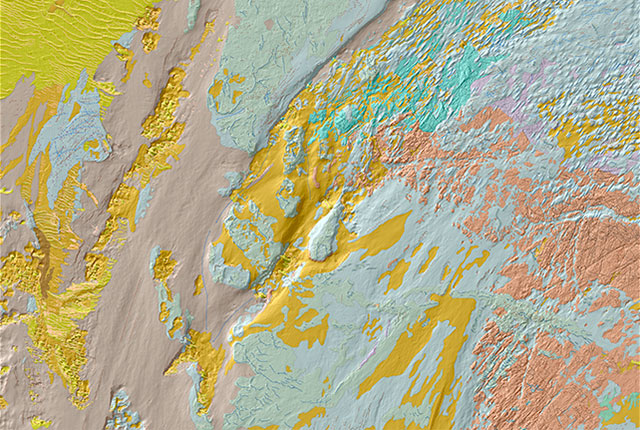
Section of the BGS Seabed Geology 10k Anglesey map, featuring combined bedrock, sediment and geomorphology interpretations. These resources provide valuable information to support policy and decision makers, as well as developers of offshore renewable energy. Contains data acquired by the MCA a 2.5 km nd by Defra © Crown Copyright 2022
Impact
Reduced risk and increased opportunity in all interactions with the subsurface, including resource development, water supply, infrastructure, built environment and environmental management.
What will we deliver?
A new programme of systematic 2D and 3D geological survey for the UK, targeting strategic priorities onshore and across our continental shelf.
How will we deliver this?
Through acquisition of new, accurate information from a programme of 2D and 3D geological mapping, BGS will provide evidence-based knowledge of
the UK’s geology. This programme will also build a sustainable pipeline of relevant and accessible knowledge of and expertise in the geology of our country. In partnership with key stakeholders, we will generate new, strategically aligned science and business opportunities.
We will develop mechanisms for the delivery of UK geological information and integrate our mapping of the UK onshore and continental shelf. We will improve efficiency and quality, using new methods and approaches to improve surveys and maximise the value of spatial data. We aim to expand our capability in airborne geophysical surveys to promote efficient, seamless and value-added geological understanding of and data for the UK.
A more secure energy transition
Enabling the use of the subsurface to deliver net zero and resource security for the UK
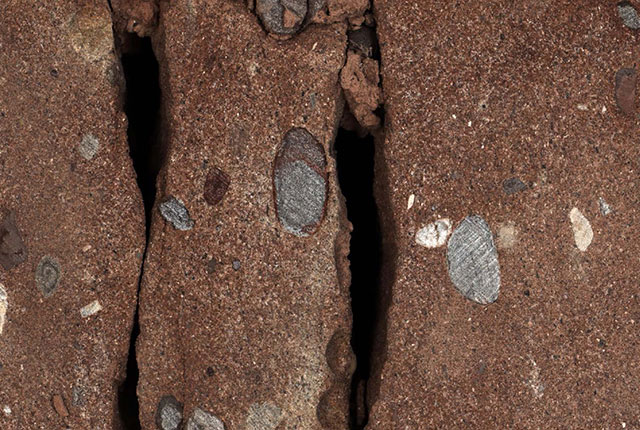
Section of core from the UK Geoenergy Observatory in Cheshire, featuring sandstone from the Chester Formation of the Triassic Sherwood Sandstone Group. BGS © UKRI
Impact
Improved access to secure, affordable, sustainable energy and subsurface raw materials, contributing to economic prosperity and net zero targets.
What will we deliver?
New insight for our stakeholders, allowing them to optimise the role, scale and location of multiple geological decarbonisation technologies in the UK.
How will we deliver this?
BGS will facilitate the implementation of subsurface, zero-carbon technologies by delivering data, analysis and knowledge. We will use basin- and site-scale assessment and modelling to enhance geological understanding and enable stakeholders to deploy multiple decarbonisation projects.
With emphasis on a portfolio of subsurface decarbonisation technologies, we will identify suitable locations in the UK and employ multi-scale assessment and modelling to enhance geological understanding. This understanding will be used to identify synergies and conflicts associated with the deployment of decarbonisation projects, especially those located close to each other. With a focus on geothermal energy, carbon and energy storage, radioactive waste disposal and critical raw materials, our portfolio approach will improve the quality and timeliness of siting decisions and risk assessment, accelerating progress towards a net zero economy.
BGS will provide data, analysis and knowledge to ensure effective mineral resource management to support net zero ambitions, making sure the UK economy receives a secure and sustainable supply of domestic mineral resources. This will include the national datasets needed to underpin UK mineral sector exploration, development, permitting and regulation.
Improved water security
Recognising the subsurface and its role in water security, climate
change adaptation, human health and livelihoods
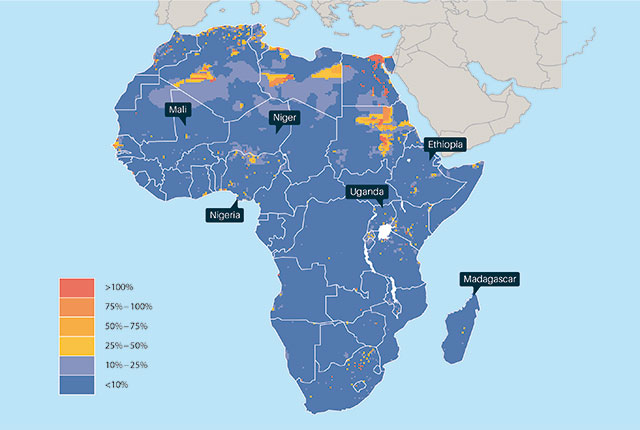
Percentage of renewable groundwater withdrawn each year, based on current population using 130 litres per person per day. BGS © UKRI
Impact
Increased water supply security through better understanding, monitoring, quantification and modelling of groundwater availability and quality, accounting for future impacts of both climate change and emerging technologies.
What will we deliver?
The integration of groundwater within a wider water security framework and quantification of resource potential, limits, value and resilience.
How will we deliver this?
As a recognised UK authority on environmental security and forecasting change, BGS will employ its world-leading research, geological expertise, laboratories and long-term datasets to provide analysis and understanding of groundwater, aquifers
and soils. We will investigate how the subsurface impacts on floods and droughts, and soil resources, their sustainability and function. We will characterise groundwater resources and emerging water-quality constraints.
Working with stakeholders, we will forecast nearfuture and longer-term water resource status and develop digital products and services for the timely release of up-to-date information.
Living with geological hazards
Risk mitigation and adaptation through monitoring, characterisation and forecasting of hazardous processes and their impacts
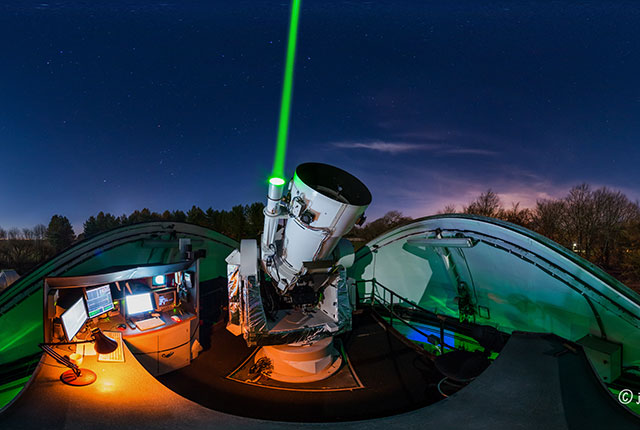
The Space Geodesy Facility at Herstmonceux operates the UK’s sole satellite laser ranging station. The facility provides precise tracking of geodetic and earth observation satellites, including those measuring sea level, the geomagnetic field and the geoid. These observations help define the Earth’s reference frame and support measurement of climate induced global change. © Photography by John Fox FRAS
Impact
Reduced societal costs of geological and associated environmental hazards through improved access to monitoring data, forecasts, authoritative information and advice.
What will we deliver?
A UK-based centre of expertise in resilience to geological hazards as well as hazards associated with geomagnetic activity globally, providing greater harmonisation in hazard and risk analysis, focused on mitigation and adaptation to hazardous climate change impacts.
How will we deliver this?
We will map and monitor earth hazards using observational methods and infrastructure. We will characterise earth processes and hazards such as landslides, subsidence, earthquakes, extreme space weather, groundwater flooding and volcanic hazards to improve understanding of their distribution in space and time. Through further analysis of individual and compound hazards and their impacts, we will deliver products and services to meet the needs of our stakeholders.
We will analyse risk through the evaluation of vulnerability and exposure, determining the potential impacts of multiple hazards on communities, infrastructure and systems, the environment, and the economy. We will continue to develop innovative technologies, enhanced sensors and networks, analytical tools, and tailored platforms. We will develop communication strategies to influence community response to natural hazard risks.
Strategic pillars
Our science priorities and the broader science challenge programme are underpinned by six strategic pillars. These have a fundamental, cross cutting role in the delivery and impact of our science.
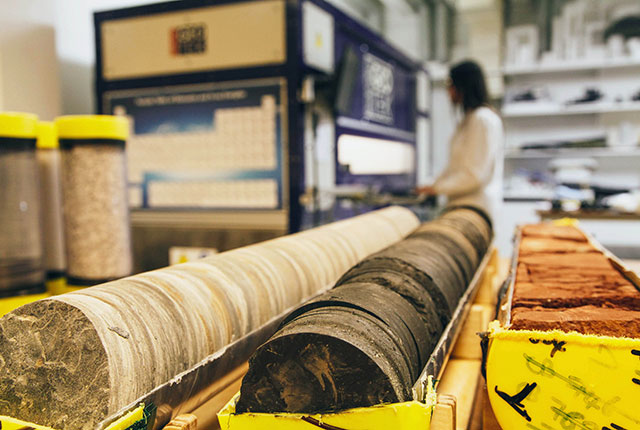
BGS Core Scanning Facility. BGS © UKRI
They comprise:
- data and knowledge
- observatories and laboratories
- science into policy
- subsurface planning
- public engagement
- diverse and skilled workforce
We are committed to these pillars, which are vital in enabling our science programme and priorities for the next five years (Figure 1).
Data and knowledge
Enhancing delivery, communication and use of our scientific outputs by the global community.
What will we deliver?
An increase in the global use of data generated through BGS science and by stakeholder communities.
How will we deliver this?
We will enhance our data capture platform and pipeline to release the value of our geospatial data. We will integrate this geospatial data with that derived from analytical facilities, observatories and sensing networks. We will create more digital
datasets from physical data assets and invest in findable, accessible, interoperable and reusable (FAIR)-compliant data management, storage and development.
Specifically, we will:
- provide authoritative regional and national geological data (both digital and analogue) to our stakeholders
- deliver integrated datasets using open, standardised formats, schemas and vocabularies to enable future research
- create platforms and applications that enable stakeholders to search, access, manipulate and visualise data and products
- analyse and process data to deliver geoscientific knowledge that will enrich and enable science research
- use our derived scientific datasets to develop innovative technology, infrastructure, tools and platforms
Observatories and laboratories
Delivering world-leading observational and analytical facilities to address societal and environmental challenges.
What will we deliver?
Integrated observational and analytical facilities to support the sensing and characterisation of geological materials and processes across multiple scales. We will provide our stakeholders with equitable access to BGS expertise, capabilities and data as an integral part of BGS’s science delivery.
How will we deliver this?
We will improve digital workflows and data interoperability, enhancing the effectiveness of our observational and analytical facilities.
Specifically, we will:
- enhance relationships with our stakeholders and our partnerships with national and international agencies and networks
- drive integration, digital workflows, systematic analyses and innovation across all our facilities
- develop facilities through open, digital delivery of integrated, laboratory-scale and FAIR-compliant data and knowledge, underpinning the breadth of BGS’s science programme
- integrate laboratory-derived information with macroscale studies (such as mapping and monitoring) at the regional and national scales, through observatories and sensing systems, to improve characterisation of the Earth
Science into policy
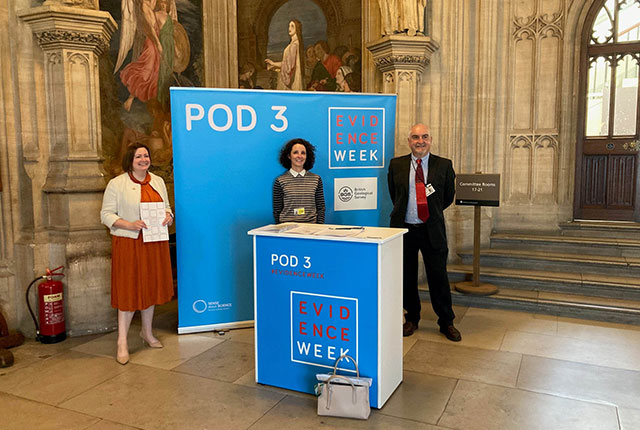
BGS advising on the potential of geothermal energy at Parliament. © Sense about Science
Informing debate, improving decision making and enhancing policy and regulation with impartial evidence and advice.
What will we deliver?
Independent and authoritative advice to the UK Government and the national administrations in Scotland, Wales and Northern Ireland through targeted delivery of our data, knowledge and expertise.
How will we deliver this?
We will support and inform evidence-based policy development and decision making across the UK and internationally. We will focus on our science priority areas and be more visible to the policy community.
Specifically, we will:
- provide the UK Government and other stakeholders with the breadth and depth of BGS’s expertise and perspective on topics related to our science priorities
- improve our overall visibility and our ability to react and deliver data and knowledge to inform evidence-based policy
- actively bring earth science-related opportunities and threats to the attention of the policy community, especially where governments do not have dedicated policy teams covering these topics
Subsurface planning
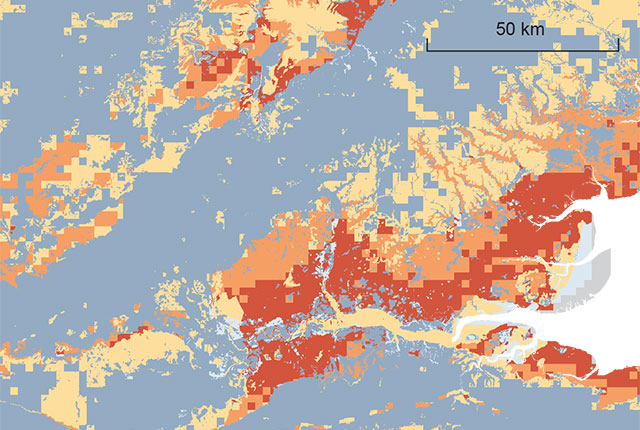
BGS GeoClimate dataset showing potential change in shrink–swell subsidence susceptibility due to changes in climate. Contains Ordnance Survey Data © Crown copyright and database right 2023
Using our knowledge of the subsurface to improve decisions about how and where to develop land to address important societal goals, including national infrastructure, economic development, housing and environmental protection.
What will we deliver?
We will adopt a more coordinated approach to our engagement with the spatial planning system that regulates the use of land for the benefit of a diverse range of stakeholders across the public sector, industry and civil society.
How will we deliver this?
We will use our data and expertise in subsurface systems and technologies to inform the spatial planning system on topics such as groundwater, mineral extraction, geothermal energy, energy storage and waste disposal. We will address the contested nature and technical complexity of underground developments and the challenge they present to the consideration and timeliness of planning decisions, as well as their impact on communities.
Specifically, we will:
- develop an informed, innovative and cross-disciplinary approach to providing geological data, knowledge and expertise to the spatial planning system
- adapt our outputs to recognise the wide variety of stakeholders in the spatial planning system across the UK, addressing the complexities associated with managing the subsurface
Public engagement
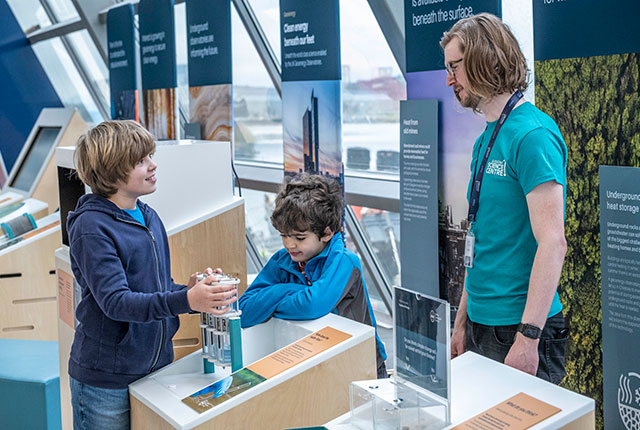
Clean Energy Beneath Our Feet exhibition at the Glasgow Science Centre. BGS © UKRI
Engaging and inspiring public groups and informing societal discourse and actions focusing on the use of geological knowledge in addressing global challenges.
What will we deliver?
We will engage in national and regional conversations, focusing on our science priorities, and develop trusted partnerships with a range of stakeholders. We will engage with a diverse audience to influence and inspire the next generation of geologists and environmental scientists.
How will we deliver this?
Alongside our partners, we will deliver targeted engagement to support learning in schools, broaden public understanding and encourage diverse communities to engage in earth and environmental science.
Specifically, we will:
- collaborate with partners to design and implement programmes focused on our science priorities that support and deliver community engagement
- enable our staff to participate in public engagement, community relations and outreach activities
- use conversations with the public to help shape their understanding of the roles geology and our scientists play in addressing global challenges
- enhance communication between scientists, policymakers and communities
Diverse and skilled workforce
Providing leadership in the development of a highly skilled workforce and a diverse earth sciences talent pipeline for the UK.
What will we deliver?
We are committed to investing in people and skills to create a working environment that supports equality, diversity and inclusion.
How will we deliver this?
We will take an active role in developing a sustainable and diverse future workforce for BGS and the wider geological professions. In partnership with key stakeholders, we will engage with and train the next generation of geologists and advance a culture of diversity and inclusivity in the geological sciences.
We will continue to engage with accreditation schemes that underpin our commitment to a diverse workforce, including the Technician Commitment, the Concordat to Support the Career Development of Researchers, Athena SWAN and Disability Confident.
Specifically, we will:
- deliver a ‘GeoAcademy’ for existing undergraduate, postgraduate and early-career scientists, including those from under-represented communities, to enhance their exposure to research skills and opportunities in geology and environmental science
- support geology and environmental science PhD students from under-represented communities through the BGS University Funding Initiative (BUFI)
- engage with existing apprenticeship schemes to enable STEM (re)training for earth scientists and technicians, encouraging them to enter the environmental science workforce
- invest in a scholarship programme for researchers engaged in historical geology to enhance engagement and promote sharing of material held in the BGS archives
Enabling environment
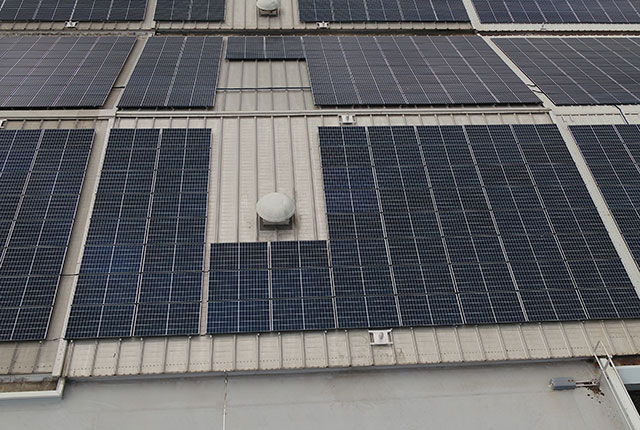
Solar panel installation on the roof of the BGS Core Store. BGS © UKRI
To deliver our science priorities, our broader science programme and the underpinning strategic pillars, BGS requires an operational infrastructure with effective and streamlined systems and processes. We need a talented and motivated workforce, sustainable financial management systems, a fit-forpurpose estate of buildings and a resilient IT network. These will function within a strong framework of risk management and assurance.
People
- Recruit, retain and develop individuals who are committed to BGS’s values and have the skills and drive to deliver the BGS Strategy
- Build a trusted, integrated leadership culture that embodies our values
- Ensure there is open and effective communication between staff and leadership
- Use ways of working that enable BGS to meet its business objectives
Financial sustainability
- Invest in improving our project and financial management capability and systems
- Enhance our business development framework to maximise income
- Maintain a deep understanding of existing markets for BGS science
- Develop and grow income from new and emerging market sectors
- Strengthen our approach to managing collaborations and partnerships
Risk management and assurance
- Continue to prioritise health and safety to embed a strong safety culture in our laboratories and observatories, during fieldwork and across all our sites
- Roll out new risk management processes and tools to all staff
- Strengthen our internal audit functions, ensuring that priority risk areas are fully addressed
- Improve our organisational resilience by renewing our focus on business continuity management
- Ensure that our processes for environmental and sustainability management reflect evolving best practice and are fully embedded in all our science and operational activities
Estates and IT infrastructure
- Review, prioritise and rationalise existing estate, laboratory and observatory infrastructure
- Work with UKRI and NERC to secure funding to deliver net zero across our estates
- Undertake a programme of modernisation and development to ensure we maintain our estates-based science facilities, including developing a business case for investment in our Keyworth site
- Ensure a secure, resilient and integrated IT infrastructure that guarantees consistent workflows onsite, offsite and for hybrid workers
Implementation
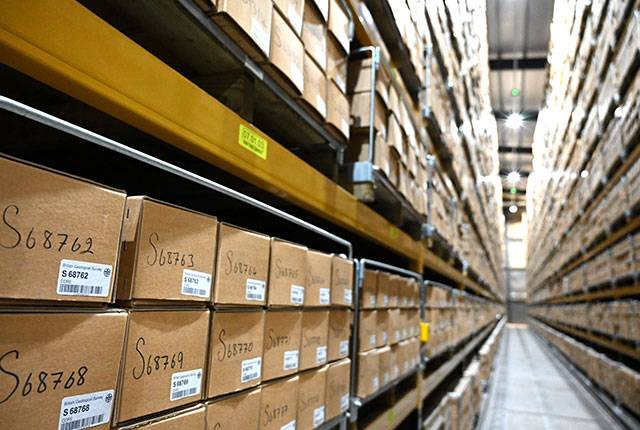
BGS Core Store. BGS © UKRI
This strategy sets out how BGS will help its stakeholders to make more effective decisions regarding geology and the role of geological processes in better managing the economy, the environment and society. We will implement this strategy through our business planning process, which is reported through a dedicated annual report published on the BGS website as a core part of the BGS Board and the NERC-BGS Memorandum of Understanding (MoU). As part of the implementation of the strategy, we will develop a process for monitoring the impact of BGS’s science, alongside our annual reporting and a five-year cycle of evaluation.
- The BGS-NERC MoU describes the governance, management arrangements and relationship between BGS and NERC
- The BGS Evaluation provides an independent evaluation of BGS’s role as defined in the MoU between NERC and BGS
- The BGS Business Plan sets out a clear roadmap of how we implement our organisational priorities, as outlined in our strategy. We report on progress against this in the BGS Annual Report




